(单词翻译:单击)
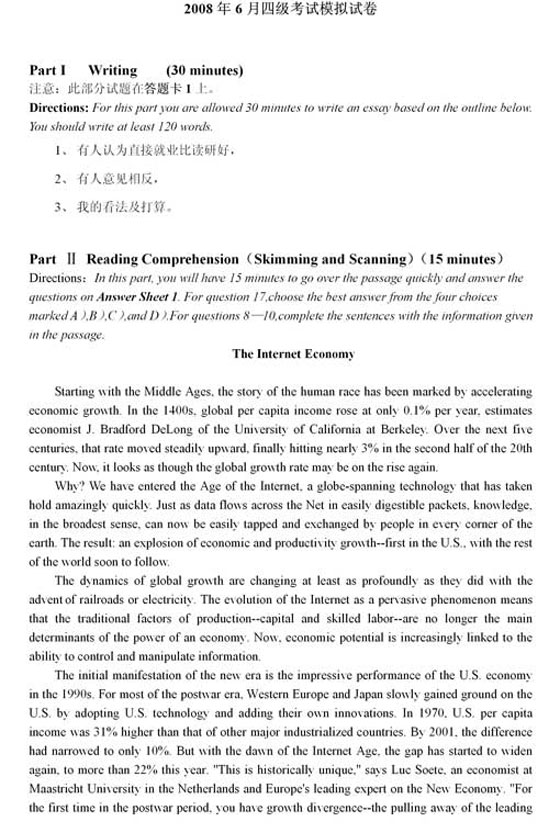
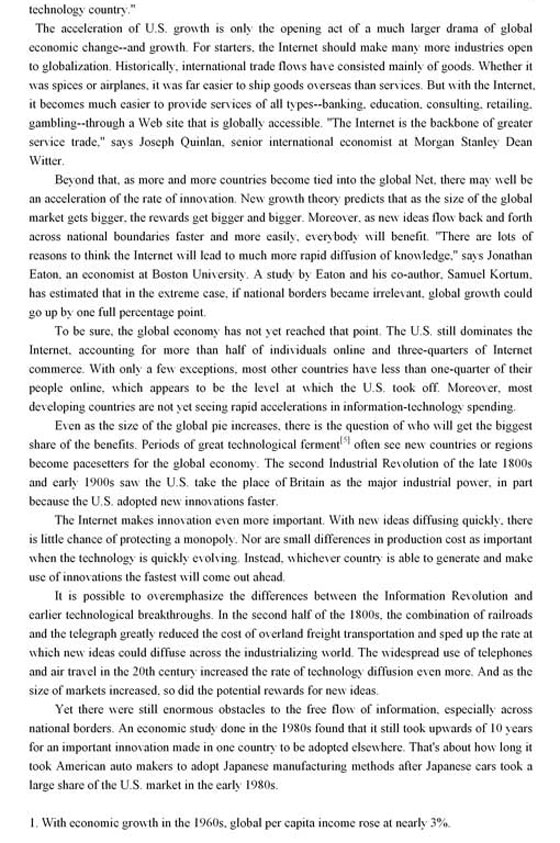
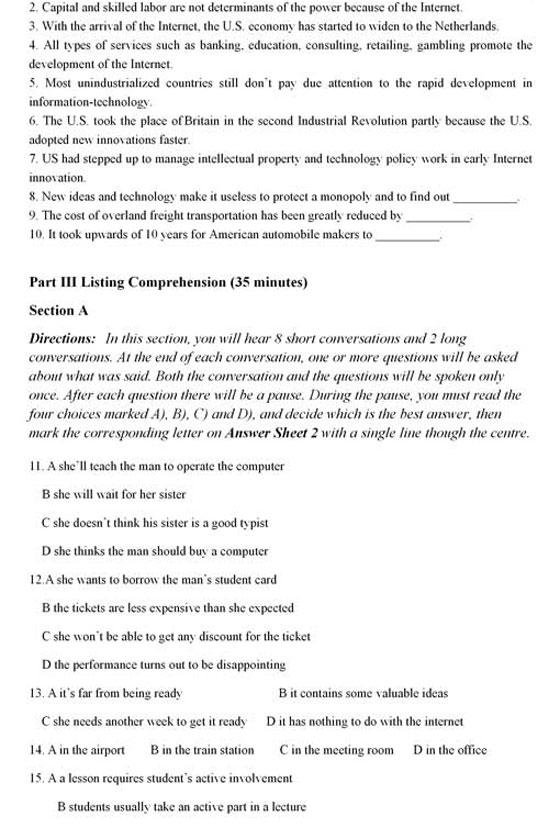
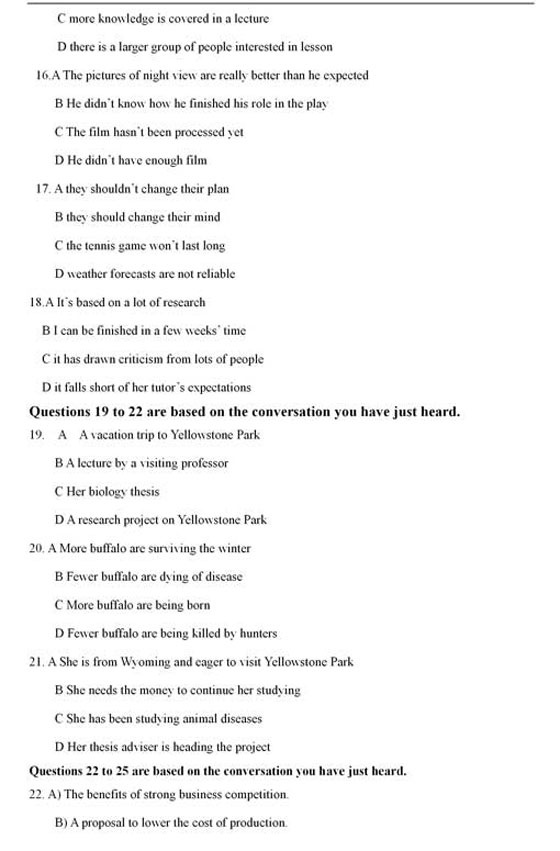
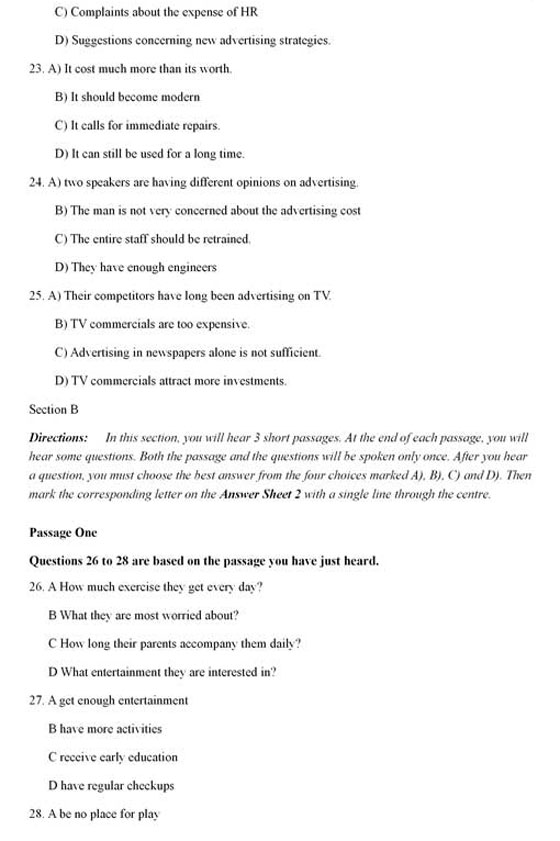
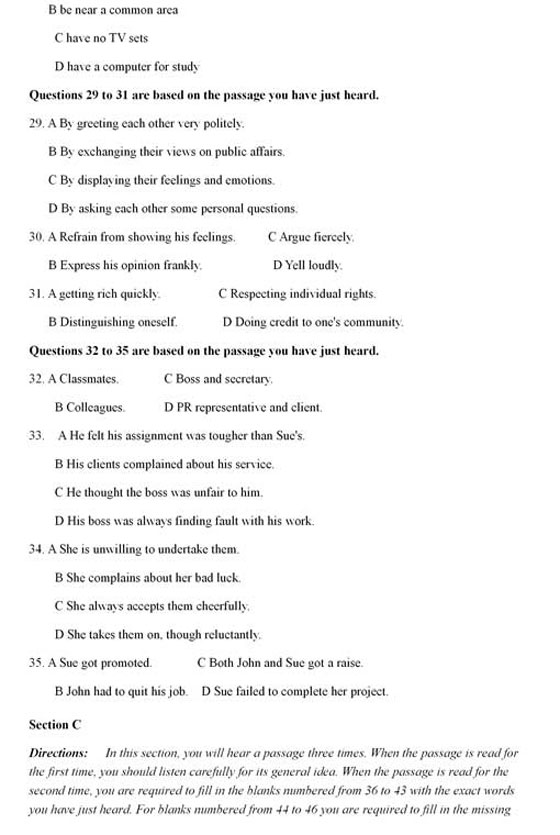
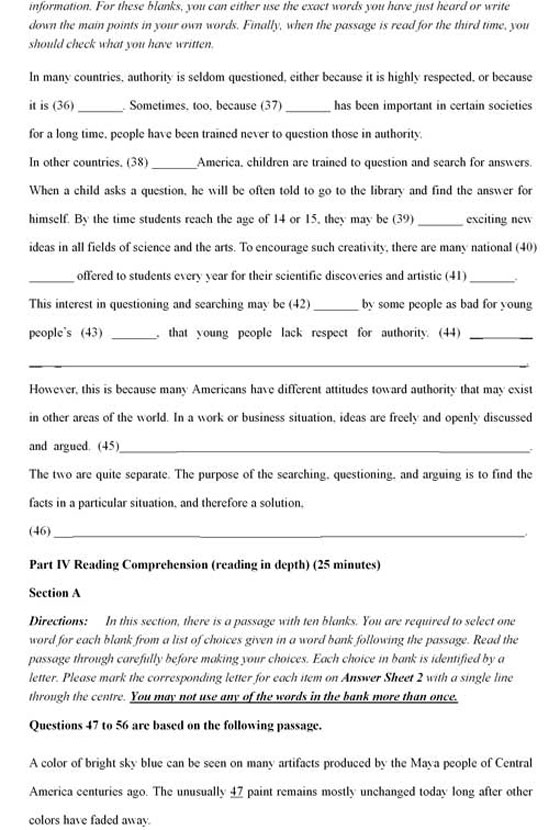
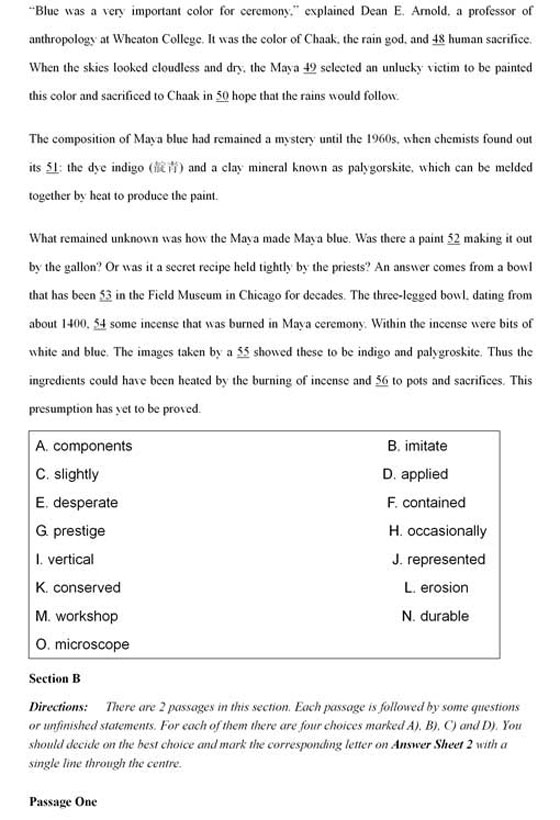

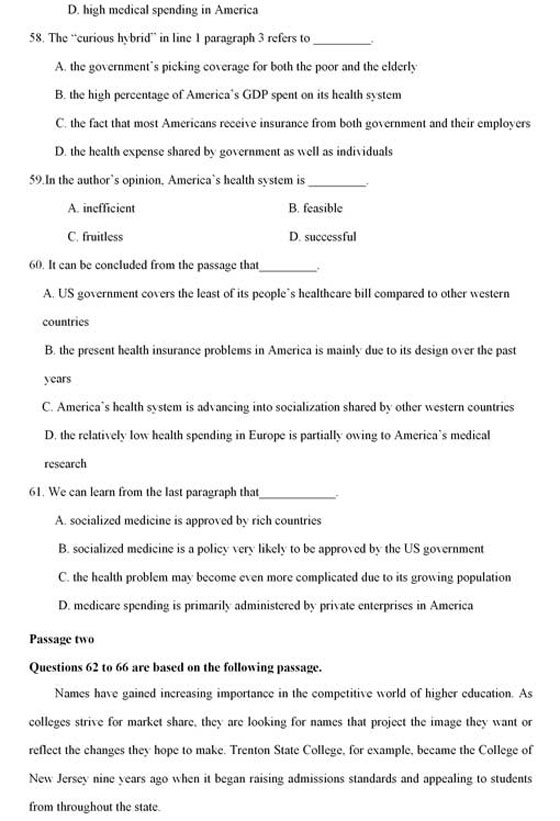
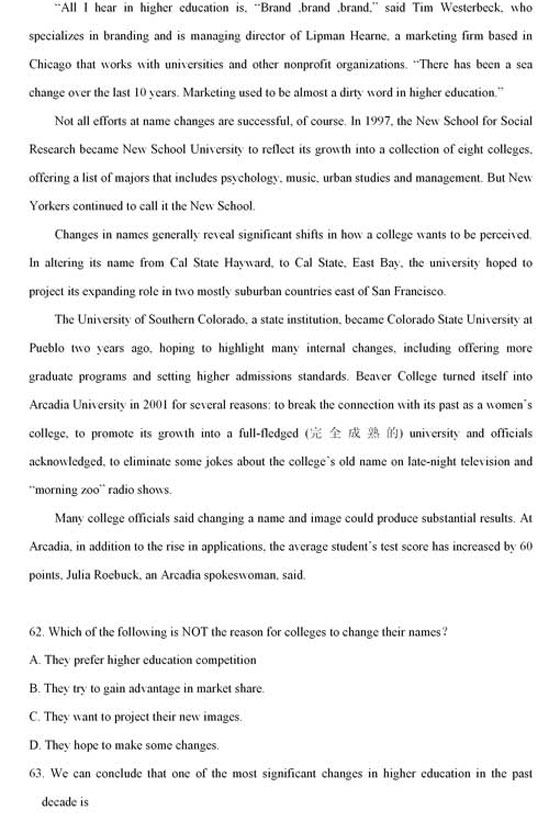
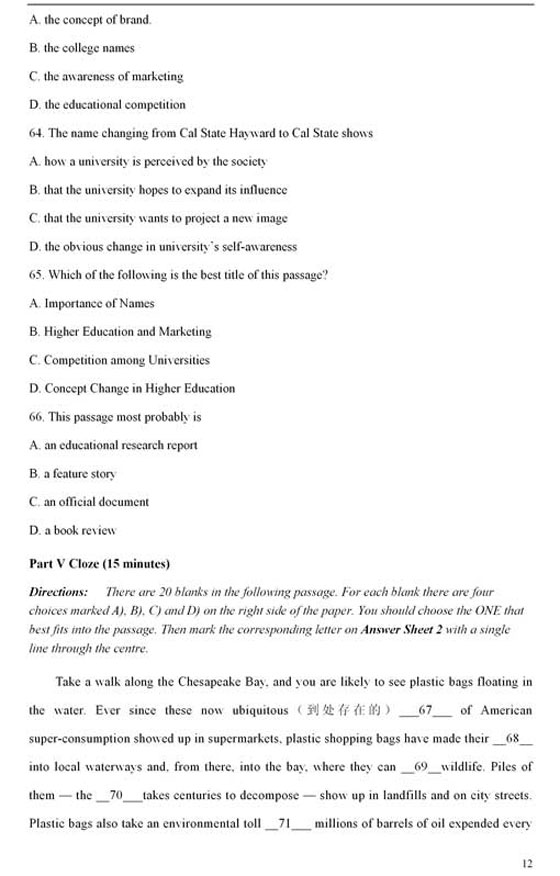

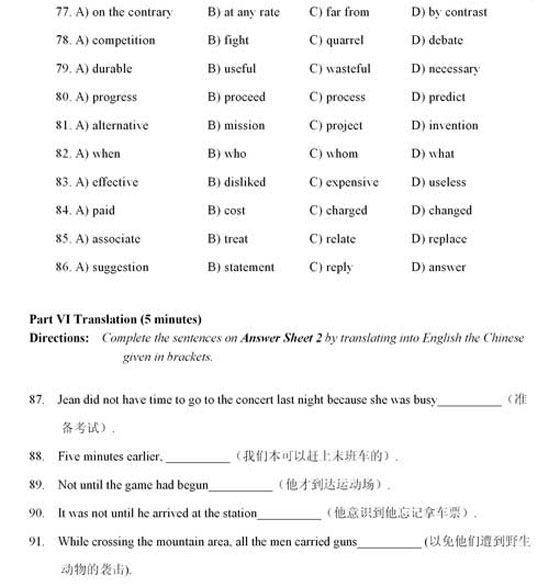
2008年6月四级考试模拟试卷答案
Part I Model Essay
Recently, there is going on a hot debate on some website’s bbs, arguing which is better ---- to go to work after graduation or to go to pursue one’s postgraduate degree, which is really not easy to give a prompt answer to.
As for such a question, different people hold different views. Someone believes that to step out of the campus to work is a better choice because it can greatly assist the students to experience the real life, acquiring more practical working experiences, thus to get maturer soon. While among the discussion, there also sounds an opposite voice, which says to seek a higher degree is more important for the young people
As far as I am concerned, I agree with the latter. Why , you may wonder ? For one thing,I have always been under the impression that academic study is the most important thing for the young. Life seems long but the study time is quite limited and it needs one’s active thought, good memory, and even the adequate energy, all of which are what the young ones most boast of. For the other, a higher degree can be greatly instrumental for a college student to find a job.
Part II
1-7:
Y,N,N,N,Y,Y,NG
8-10:
8. Small differences in production cost.
9. The combination of railroads and the telegraph.
10. Adopt Japanese manufacturing methods
Part III
11-18 ACAAADAD
19-21 DAC 22-25 DBAB
26-35 DBC DAB BCCA
36. Feared
37. Rank
38. Including
39. Developing
40. Prizes
41. Accomplishments
42. Considered
43. Manners
44 This impression may be created when visitors notice young Americans asking questions and arguing with older people.
45 It is vital to remember that it is the person’s ideas that are being questioned, not the individual himself.
46. So that the work of the business can progress in the most effective manner possible.
Part IV
47-56 N J H E A M K F O D
57-66 C D A D C A C D D B
Part V
67-71 A C A D B B C D B A
72-76 C D C B A B A C D D
Part VI
87.preparing for her examination
88.and we could have caught the last train
89.did he arrive at the sports ground
90.that he realized he had forgotten his ticket
91.lest they should be attacked by wild animals
听力原文
11. M: I am waiting for my sister to come back and type the application letter for me, the electrics company is going to recruit on campus.
W: why bother her. I’ll show you how to use the computer. It’s fairly easy.
Q: what does the woman mean?
12. M: I’ve been waiting all week for this concert. The performance is said to be excellent and with a student’s discount, the tickets will be really cheap!
W: I am sorry, but I have to tell you I lost my Student ID card in the canteen last week.
Q: what does the woman imply?
13. M: how well are you prepared for your presentation? Your turn comes nest week Wednesday.
W: I spent a whole week searching on the net, but end up with nothing valuable.
Q: what did the woman say about her presentation?
14. W: Mary, we will be boarding soon, are you sure you’ve taken everything necessary?
M: let me see…I have the air tickets, our passports and all the documents you need for the upcoming meetings.
Q: where are the two speakers?
15 W: what’s the difference between a lecture and a lesson?
M: Well, both of them are imparting knowledge, but the main difference is that a lesson involves more participation.
Q: What does the man mean?
16. W: Did your pictures of the night view come out like you expected?
M: Actually, I ran out of film before I could even begin. I didn’t realize I’d finished the roll.
Q: What do we learn from the conversation?
17 W: If the weather is this hot tomorrow we may as well give up the idea of playing tennis in the afternoon.
M: Oh, I don’t think it will last long. The weather report says it will cloud over by this afternoon.
Q: what does the man mean?
18. M: Mary, how are you doing with your thesis?
W: I finished my first draft some time ago. But my tutor said I should do more research if I want to got A plus.
Q: what do we learn about the woman’s thesis?
Conversation one
M: Thanks for stopping by, Ann. I'd like to talk to you about a research project I thought you might be interested in. A friend of mine is working at Yellowstone National Park this summer...
W: Yellowstone! I've always wanted to spend some time out in Wyoming.
M: Wait till you hear what the project is...She's working with the buffalo population. The herds have been increasing in size lately, which is good in theory...
W: Yeah...but I thought they were in danger of becoming extinct.
M: Well, apparently, because of all the winter tourists, paths are created in the snow. More buffalo are surviving the harsh winters because the paths make it easier for the buffalo to move around and find food. But it turns out that some of the herds are infected with bacteria.
W: Oh yeah, I heard about that. Bru—
M: Brucella abortus
W: Right, It's been around for quite a while.
M: Yes it has. And because the buffalo population is increasing, they've been roaming more than usual, and the disease has begun to spread to the cattle ranches that border toe park.
W: That's bad news! Isn't that the disease that causes animals to abort their young?
M: Yes, and it's caused a lot of controversy. Some of the ranchers even want to destroy the buffalo herds.
W: That's awful! Have they made much progress with the research?
M: So far, they've been collecting tissue samples from dead buffalo to see if the bacteria's present.
W: I'd really be interested in working on this. You know I've been researching dise- ased animal populations...
M: That's why I thought of you...I took the liberty of mentioning your name to my friend. She's hoping you'll be able to spend the whole summer out there.
W: Well, I was going to work on my thesis a lot in July, but I'm sure my adviser wouldn't want me to pass up this opportunity.
Questions 19 to 21 are based on the conversation you have just heard.
Q19. What did the professor want to talk to Ann about?
Q20. According to the professor, why is the buffalo population increasing?
Q21. Why does the professor think Ann would be interested in going to Yellowstone?
Conversation two
W: Hello, Gary. How’re you?
M: Fine! And you?
W: Can’t complain. Did you have time to look at my proposal?
M: No, not really. Can we go over it now?
W: Sure. I’ve been trying to come up with some new production and advertising strategies. First of all, if we want to stay competitive, we need to modernize our factory. New equipment should’ve been installed long ago.
M: How much will that cost?
W: We have several options ranging from one hundred thousand dollars all the way up to half a million.
M: OK. We’ll have to discuss these costs with finance.
W: We should also consider human resources. I’ve been talking to personnel as well as our staff at the factory.
M: And what’s the picture?
W: We’ll probably have to hire a couple of engineers to help us modernize the factory.
M: What about advertising?
W: Marketing has some interesting ideas for television commercials.
M: TV? Isn’t that a bit too expensive for us? What’s wrong with advertising in the papers, as usual?
W: Quite frankly, it’s just not enough anymore. We need to be more aggressive in order to keep ahead of our competitors.
M: Will we be able to afford all this?
W: I’ll look into it, but I think higher costs will be justified. These investments will result in higher profits for our company.
M: We’ll have to look at the figures more closely. Have finance draw up a budget for these investments.
W: All right. I’ll see to it.
Questions 22 to 25 are based on the conversation you have just heard.
Q22. What are the two speakers talking about?
Q23. What does the woman say about the equipment of their factory?
Q24. What do we know from the conversation?
Q25. What does the man say about advertising?
Passage one
Next time you bring your kids in for a checkup, don't be surprised if the doctor asks about their tastes in entertainment. The American Academy of Medicine suggested last week that doctors work with parents to evaluate how much TV kids watch and what they see, what video and computer games they play, which websites they visit on the Internet, whether they view R-rated videos without the company of their parents, what music they like and what books they read. Doctors are worried that kids who spend too much time in front of the tube don't get enough exercise and can become overweight. The academy is also concerned that the messages kids get from entertainment media can make them more violent and sexually active.
The academy recommends that children under age two not watch any TV. "Children need activities to stimulate the brain during the first two years of life," says Dr. Miriam Baron, who chairs the academy's committee on public education. "They need feedback and socialization." Older children, she says, should watch TV in a common area. Their bedrooms should be "electronic media-free" zones where they can have a quiet place to read, study, play or just relax.
Questions 26 to 28 are based on the passage you have just heard.
Q26. What unusual question may doctors ask when giving kids a checkup next time?
Q27. The academy suggests that children under age two.
Q28. According to the report, children's bedrooms should.
Passage two
American visitors to Eastern Asia are often surprised and puzzled by how Asian cultures and customs differ from those in the United States. What’s considered typical or proper social conduct in one country may be regard as odd, improper or even rude in the other. For example, people from some Eastern Asian countries may begin a conversation with a stranger by asking personal questions about family, home or work. Such questions are thought to be friendly, whereas they might be considered offensive in the United States. On the other hand, people in most Asian cultures are far more guarded about expressing their feelings publicly than most Americans are. Openly displaying annoyance or anger, yelling, arguing loudly and so forth is considered ill-mannered in countries such as Japan. Many Eastern Asians prefer to hold their emotions in check and instead express themselves with great politeness. They try not to be blunt and avoid making direct criticisms. In fact, they often keep their differences of opinion to themselves and merely smile and remain silent rather than engage in a confrontation. By comparison, Americans are often frank about displaying both positive and negative emotions on the street and in other public places. Americans visiting Asia should keep in mind that such behavior may cause offense. A major difference between Americans culture and most Asian cultures is that in Asia, the community is more important than the individual. Most Americans are considered a success when they make a name for themselves.
Questions 29 to 31 are based on the passage you have just heard.
Q29. How would some Asians start their conversation when they meet for the first time?
Q30. What would a Japanese do when he feels annoyed?
Q31. What is encouraged in American culture according to the passage?
Passage three
Both John and Sue joined the staff of a successful public relations firm in New York during the same year. They had just completed their PR degrees at a nearby university and were thrilled to be hired by one of the finest PR firms in the city. John’s first assignment was to create a promotion campaign for a client who was putting a new game on the market. Initially Sue was assigned to work with a sportswear company on a marketing concept for its newest line of clothing. As time passed and work with their respective first clients became more and more difficult, John and Sue realized that they had been assigned two of the toughest clients in town. Although John completed his assignments quickly and successfully, he was furious when he learned that the boss had deliberately assigned him a difficult client. In response he not only complained to his colleagues but also to the boss’s secretary. Sue, on the other hand, had a more difficult time satisfying her first client and she took several additional months to actually complete the assignment. However, she just laughed when she heard that the boss had made the assignment purposely. Over the next two years, John worked reluctantly with each assignment and problem that he encountered. Sue accepted each assignment cheerfully. And when problems arose, she responded with her characteristic “No problem, I can handle it.” Although Sue took longer to complete her projects than John and both were equally successful on the assignments they completed, Sue was given the first promotion when there came a vacancy.
Q32. What’s the relationship between John and Sue now?
Q33. Why was John furious after he finished his first assignment?
Q34. What’s Sue’s attitude to difficult tasks?
Q35. How does the story end?
Compound dictation
In many countries, authority is seldom questioned, either because it is highly respected, or because it is (36) feared. Sometimes, too, because (37) rank has been important in certain societies for a long time, people have been trained never to question those in authority.
In other countries, (38) including America, children are trained to question and search for answers. When a child asks a question, he will be often told to go to the library and find the answer for himself. By the time students reach the age of 14 or 15, they may be (39) developing exciting new ideas in all fields of science and the arts. To encourage such creativity, there are many national (40) prizes offered to students every year for their scientific discoveries and artistic (41) accomplishments. His interest in questioning and searching may be (42) considered by some people as bad for young people’s (43) manners, that young people lack respect for authority. (44) This impression may be created when visitors notice young Americans asking questions and arguing with older people.
However, this is because many Americans have different attitudes toward authority that may exist in other areas of the world. In a work or business situation, ideas are freely and openly discussed and argued. (45) It is vital to remember that it is the person’s ideas that are being questioned, not the individual himself. The two are quite separate. The purpose of the searching, questioning, and arguing is to find the facts in a particular situation, and therefore a solution,
(46) so that the work of the business can progress in the most effective manner possible.


